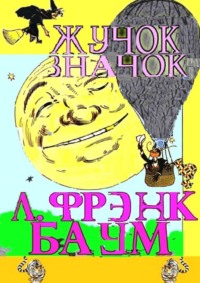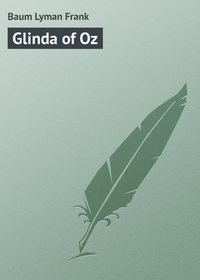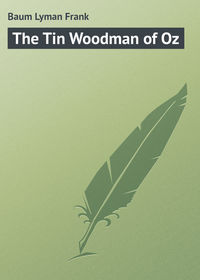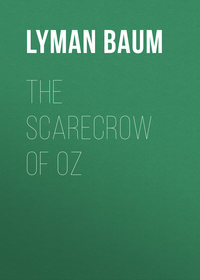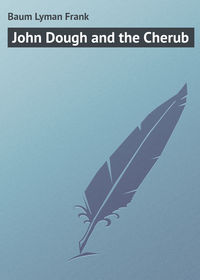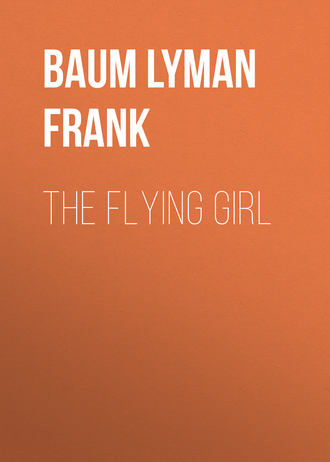 полная версия
полная версияThe Flying Girl
“I am your niece,” she replied, slowly and deliberately.
“Oh!” he exclaimed; then paused to observe her curiously. “So, you are my sister Marian’s daughter.”
“Exactly.”
“I knew she had a child, for often she wrote me about it; but her early death and my estrangement with your father prevented me from seeing you, until now. Your mother, my dear, was a – a noble woman.”
“You are not telling the truth,” said Sybil, quietly. “She was quite the contrary.”
He started and flushed. Then he replied, somewhat confused by the girl’s scornful regard:
“At least, I loved her. She was my only sister.”
“And your accomplice.”
“Eh?” He stared, aghast. Then, quickly recovering himself, he remarked:
“You were rather too young, when she died, to judge your mother’s character correctly.”
“It is true; but I remember her with abhorrence.”
“Your father, on the other hand,” observed Mr. Burthon, his face hardening, “might well deserve your hatred and aversion. He is a scoundrel.”
“I have heard him say so,” replied Sybil, smiling, “but I do not believe it. In any event his iniquity could not equal that of the Burthons.”
“We are complimentary,” said her uncle, returning the smile with seeming amusement. “But I regret to say I have no time to further converse with you to-day. Will you call again, if you have anything especial to say to me?”
“No,” replied Sybil. “You must listen to me to-day.”
“To-morrow – ”
“To-morrow,” she interrupted, “you may be in prison. It is not easy to interview criminals in jail, is it?”
He looked at her now with more than curiosity; his gaze was searching, half fearful, inquiring.
“You speak foolishly,” said he.
“Yet you understand me perfectly,” she returned.
“I confess that I do not,” he coldly persisted.
“Then I must explain,” said she. “When my mother died I was but eight years of age. But I was old for my years, and on her deathbed your sister placed in my hands a sealed envelope, directing me to guard it carefully and secretly, and not to open it until I was eighteen years of age – and not then unless I had in some way incurred the enmity and persecution of my uncle, George Burthon. She said it was her confession.”
He sat perfectly still, as if turned to stone, his eyes fixed full upon the girl’s face. With an effort he said, in a soft voice:
“Have I persecuted you?”
“Indirectly; yes.”
“But you cannot be eighteen yet!”
“No,” she admitted; “I am only seventeen.”
He breathed a sigh of relief.
“Then – ”
“But I am half a Burthon,” Sybil continued, “and therefore have little respect for the wishes of others – especially when they interfere with my own desires. I kept the letter my mother gave me, but had no interest in opening it until the other day.”
“And you read it then?”
“Two or three times – perhaps half a dozen – with great care.”
“Where is that letter now?”
“Where you cannot find it, clever as you are. I may say I have great respect for your cleverness, my dear uncle, since reading the letter. How paltry the story of Dr. Jekyl and Mr. Hyde seems after knowing you!”
He moved uneasily in his seat; but the man was on the defensive now, and eyed his accuser steadily.
“You seem much like your mother,” he suggested, reflectively.
“But you are wrong; I am more like my father.”
He shrugged his shoulders.
“What matter, my child? You have a rare inheritance, on either side.”
They sat in silence a moment. Then he said:
“You have not yet confided to me your errand.”
“True. I have a request to make which I am sure you will comply with. You must stop annoying the Kanes.”
He smiled at her.
“You have marked them for your own prey – you and your precious father?”
“Yes. Your persecution must cease, and at once.”
He seemed thoughtful.
“I have an end in view,” said he; “an important end.”
“I know; you want to force Orissa to marry you. But that is absurd. She is scarcely half your age, and – she despises you.”
He flushed at this.
“Nevertheless – ”
“I won’t have it!” cried Sybil, sternly. “And, another thing: you must withdraw your aëroplane from the aviation meet to-morrow.”
“Must?”
“I used the word advisedly. I have the power to compel you to obey me, and I intend to use it.”
He sat watching her with his eyes slightly narrowed. Sybil was absolutely composed.
“Your mother, my dear,” he presently remarked, “was a – charming woman, but inclined to be visionary and imaginative. I have no idea what she wrote in that letter, but if it is anything that asperses my character, my integrity or fairness, it is not true, and can only be accounted for by the fact that the poor creature was driven insane by your father, and did not know what she was doing.”
“Oh, indeed!” the girl retorted. “Is it not true, then, that you were convicted in Baltimore, twenty years ago, of a dastardly murder and robbery, and sentenced by the court to life imprisonment? Is it not true that my mother at that time contrived your escape and secreted you so cleverly that the officers of the law could never find you?”
“It is not true,” he declared, speaking with apparent effort.
“The letter states that you were arrested and convicted under the name of Harcliffe; that when active search for you was finally abandoned you went with my mother to Chicago, and there began a new life under your right name of Burthon; that there your sister met and married my father, although you opposed the match bitterly, fearing she would betray your secret to her husband. But she never did.”
“It is not true,” he repeated. “The whole story is but a tissue of lies.”
“Then,” said Sybil, “I will telegraph to the police of Baltimore that the escaped prisoner, Harcliffe, whom they have been seeking these twenty years, is here in Los Angeles, and ask them to send at once someone to identify him. You need not be afraid, for the story is false. They will come, I will point you out to them, and they will declare you are not the man. Then I will believe you – not before.”
He sat a long time, his head upon his hand, looking at her reflectively. At the same time her dark eyes were fixed upon him with equal intentness.
By and by she laughed aloud, but there was no mirth in the sound.
“Not that, dear uncle,” she said, as if he had spoken. “Am I not my mother’s daughter, and my clever uncle’s own niece? You cannot quiet me by murder, for in that case my revenge is fully provided for. I know you, and I did not venture upon this disagreeable errand unprepared. There is a plain clothes man at the street door, who, if I do not emerge from this club in – ” she looked at her watch – “in fifteen minutes, will summon assistance, guard every exit, and then search your rooms for my body. The doorkeeper has my name and knows that I am here. Therefore, to injure me now would be to thrust your head into the hangman’s noose. Afterward you will be very considerate of my welfare, for from this day any harm that befalls me will lead to your prompt arrest and the disclosure of your secret.”
He threw out his hands with a despairing, helpless gesture.
“What a demon you are!” he cried.
“I believe I am,” said Sybil, slowly. “I hate myself for being obliged to act in this dramatic fashion – to threaten and bully like a coward – but being blessed with so unscrupulous an uncle I cannot accomplish my purpose in a more dignified way.”
“State your demands, then,” said he.
“I have stated them.”
“To withdraw my aëroplane from the aviation meet would mean my ruin. I have sold my real estate and brokerage business and invested my money in aviation; I positively cannot withdraw now.”
“You must. To whine of ruin is absurd. I know that my father paid you a quarter of a million for your mine. You also obtained, without doubt, a good sum for your business. So far you cannot have invested more than a few thousand dollars in your attempt to steal Stephen Kane’s invention. My advice, sir, is to get away from here as soon as you can. Go to London or Paris, where there is more interest in aviation than here, and make a business of flying, if you will. But the Kane device is fully protected by foreign patents, and any infringement will be promptly prosecuted.”
“You are merciless,” he complained.
“You will find me so.”
“I am a member of the Aëro Club. I cannot, without arousing suspicion, withdraw my aëroplane from the meet.”
“If you do not I will telegraph to Baltimore.”
The threat seemed to crush him and still any further remonstrances.
“Very well,” he returned; “if you have finished your errand please leave me. I must – consider – my – position.”
She rose, cast one scornful glance at him and walked out of the room, leaving him seated with bowed head, dejected and utterly defeated.
CHAPTER XXI
MR. H. CHESTERTON RADLEY-TODD
There lived in Los Angeles at that time one of those unaccountable individuals whom nature, in fashioning, endows with such contradictory qualities that their fellow creatures are unable to judge them correctly.
He was a young man, fresh from college, whose name was engraved upon his cards as H. Chesterton Radley-Todd, but whom his new acquaintances promptly dubbed “Chesty Todd.” Having finished his collegiate course he had been at a loss what to do next, so he drifted to the Pacific coast and presently connected himself with the Los Angeles Tribune as literary critic, society reporter and general penistic roustabout.
Mr. Radley-Todd had a round, baby face; expressionless and therefore innocent blue eyes that bulged a little; charmingly perfect teeth; an awkward demeanor; a stumbling, hesitating mode of speech and the intellectual acumen of a Disraeli. He was six feet and three inches tall and dressed like a dandy. People estimated him as a mollycoddle at first acquaintance; wondered presently if he possessed hidden talents, and finally gave him up as a problem not worth solving. No one believed in his ability, even when he demonstrated it; because, as they truly said, he “did not look as if he amounted to shucks.”
That such a callow youth, predoomed to adverse judgment, should be able to secure a position on a daily paper seemed remarkable. But the Tribune loves to employ green and budding “talent,” which can be had at a nominal salary. The managing editor shrewdly contends that these young fellows work with an enthusiasm and perseverance unknown to older and more experienced journalists, because they have a notion that the world is their oyster and a newspaper job the knife that opens it. When they discover their mistake they are dismissed and other ambitious ones take their places. Mr. H. Chesterton Radley-Todd was at present enjoying this fleeting prominence, and occasionally the editor would read his copy with genuine amazement and wonder from what source he had stolen its brilliance and power.
So, when the great aviation meet approached and every man, woman and child in Southern California was eager for details concerning it and demanded pages of description of the various participating aëroplanes and aviators, in advance of their exhibition, and when Tom Dunbar, the Tribune’s expert on aviation, was suddenly stricken with pneumonia, “Chesty” Todd was assigned to this important department.
“Dig for every scrap of information that can possibly be unearthed,” said the editor to him. “Spread it out as much as you can, for the dear public wants a cyclone of aërial gossip and will devour every word of it. When there isn’t any broth don’t fear to manufacture some; any ‘mistake’ in the preliminaries will be forgotten as soon as the big meet is in full swing.”
Chesty nodded; stumbled against a chair on his way out; stepped on the toe of the private stenographer and slammed the door to muffle her scream. Then he made his way to Dominguez Field; strolled among the hangars with his hands in his pockets and imbibed unimportant information by the column.
Two things, however, really interested the reporter. One was the popular interest in the Kane Aircraft, which was now in its hangar and invited inspection. Wilson and Brewster, the latter now openly in the employ of Mr. Cumberford, guarded the local aëroplane and explained its unique features to an eager throng. For, although the Kane hangar was in a retired location – “around the corner,” in fact – a bigger crowd besieged it, on this last day preceding the official opening of the meet, than visited the older and better known devices. Stephen Kane’s remarkable flight at Kane Park, which was followed by his peculiar accident, was of course responsible for much of the interest manifested in his machine; and this interest was shared by the experienced aviators present, who silently examined the novel improvements of the young inventor and forbore to discuss them or their alleged merits.
“What do you think of it?” Chesty Todd asked an aviator of national prominence.
“Looks good,” was the evasive reply. “Cumberford, who is managing the Kane campaign, has been trying hard to get a man to fly it, but so far without success. Pity the thing can’t be exhibited. Young Kane, who was entered as the aviator, broke his leg and is now out of it.”
The reporter made a mental note of this; he would find out the plans of the Kane party and make a two column story of their hope or despair.
Later in the afternoon another thing puzzled him. Burthon, the direct competitor of Kane, suddenly and without explanation withdrew his aëroplane from the meet and actually took it from the field, closing his hangar. The officials and others interested were amazed, and the action aroused considerable comment.
Chesty Todd scented a story. He secured an automobile and followed Burthon and Tot Tyler at a distance, until they placed the aëroplane in the old workshop at South Pasadena. He crept up to the shed unobserved and found half a dozen men busily putting the parts together again and preparing the device for use. Why, since it had been withdrawn from the aviation meet?
Todd and Burthon walked out and went to a near by restaurant, where the reporter found them seated in a corner engaged in earnest conversation. Chesty made signs to the waiter that he was deaf and dumb, secured a seat at a table within hearing distance of Burthon and his chauffeur, and overheard enough to give him a clew to their latest conspiracy. Then he went away, regained his automobile and drove straight to the Alexandria Hotel.
Mr. Cumberford had insisted on the Kanes taking rooms at the hotel during the meet, and all three were now established there, Mrs. Kane having decided to go each day to Dominguez, where Stephen and Sybil could tell her of the events as they occurred. In a way the blind woman would thus be able to participate and avoid the anxiety and suspense of remaining at the bungalow while her daughter undertook the hazardous feat of operating Stephen’s aëroplane. The Cumberford automobile was placed at the disposal of mother and son, and the young inventor could watch the flight of his machine while propped among the cushions, Sybil being at his side to attend him and his mother.
The party had just finished dinner and assembled in the Cumberford sitting room when Chesty Todd’s card was brought in. It was marked “Tribune” and Mr. Cumberford decided to go down to the office and see the reporter, as it was not his purpose to snub the press at this critical juncture. However, the young man discouraged him at first sight. His appearance was, as usual, against him.
“Will the Kane Aircraft take part in the contests?” he inquired.
“Certainly,” replied Mr. Cumberford.
“You have secured a man to – er – run the thing?”
“We have secured an operator.”
Chesty stared at him, his comprehensive mind alert. Why did Cumberford turn his reply to evade the “man” proposition? Could a woman operate an aëroplane? Perhaps none but an inexperienced youth would have dreamed of the possibility.
“Has Stephen Kane any family?” he cautiously asked.
“A mother and sister. He is unmarried.”
“How old is the sister?”
“Seventeen.”
“Oh!” The age seemed to eliminate her. “And the mother?”
It was Cumberford’s turn to stare.
“The mother is blind,” he said.
Mr. Radley-Todd’s thoughts took another turn.
“Have you a family, sir?”
“I have a daughter, an only child. Mrs. Cumberford is not living.”
“And your daughter’s age, sir?”
“Seventeen. She is the same age as Orissa Kane.”
“Are the young ladies – er – interested in airships?”
Mr. Cumberford did not like these questions. He knew that a reporter is akin to a detective, and began to fear the youth was on the track of their secret. So he answered rather stiffly:
“Fairly so. Everyone seems interested in aviation these days. It interests me.”
Chesty saw he would not confess; so he tried another tack.
“Mr. Burthon is your brother-in-law, I believe.”
Mr. Cumberford nodded.
“You are – eh – enemies?”
“Mr. Radley-Todd, or whatever your name is,” angrily glancing at the card, “I do not object to being interviewed on the subject of the Kane Aircraft, or the coming aviation meet. But your questions are becoming personal and are wide of the mark. You will please confine yourself to legitimate topics.”
The young man rose and bowed.
“Excuse me,” he said in his halting way; “a reporter is often forced to appear impertinent when he does not intend to be so. At present I am – er – face to face with a curious – er – complication. I have discovered – eh – unintentionally – that your er, er – aviator will be in great danger to-morrow. If it’s a man, I don’t care. I don’t like you, Mr. Cumberford, and I wouldn’t lift a finger to save the Kane Aircraft from going to pot. Why should I – eh? It’s nothing to me. But if one of those girls – your daughter or Kane’s sister, is to fly the thing, I feel it my – er – duty to say: look out!”
He started to go, but Cumberford grabbed his arm.
“What do you mean?” he demanded sternly.
“Is it a girl?”
“You won’t betray us? You won’t publish it?”
“Not at present.”
“Orissa Kane will operate the aircraft.”
Chesty looked at his boots reflectively.
“Don’t let her undertake it, sir,” he said. “If you can’t find a man, follow Burthon’s example and withdraw your – eh – airship from the meet. Better withdraw it, anyhow – that’s the best move – if you don’t wish to court disaster.”
“Explain yourself, sir!”
“I won’t. I’m not going to spoil a good story for my paper – and a scoop in the bargain – to satisfy your curiosity. But Miss Kane – May I see her a moment?”
Mr. Cumberford reflected.
“If you warn her of danger you will take away her nerve. She’s the only person on earth competent to operate the Kane Aircraft, and to withdraw the aëroplane would mean the ruin of her brother’s fortune and ambitions.”
“I don’t know her brother; I don’t care a fig for him. If I see the girl I shall warn her,” said the reporter.
“Then you shall not see her.”
“Very good. But you will tell her to look out?”
“What for?”
“For danger.”
“When?”
“At all times; especially during her flight.”
“There is always danger of accident, of course.”
“This won’t be an accident – if it happens,” said Chesty Todd, decidedly.
“But who would wish to injure Orissa?” asked Cumberford, wonderingly.
“Think it over,” said the reporter. “If you’ve one deadly enemy – a person who will stick at nothing, being desperate – that’s the man.”
With this he coolly walked away, leaving Mr. Cumberford considerably disturbed. But he thought it over and decided to say nothing to Orissa. The warning might refer to Burthon, who was the only person they might expect trouble from, although to Cumberford’s astonishment Burthon had quit the field at the last moment and abandoned the contest. Knowing nothing of Sybil’s interview with her uncle, that action seemed to indicate, to Cumberford’s mind, that Burthon had weakened.
Under no circumstances would he have permitted Orissa to face an unknown danger, but it occurred to him, after thinking over the interview, that Mr. H. Chesterton Radley-Todd was a fair example of a fool.
CHAPTER XXII
THE FLYING GIRL
The morning of the first day of the long heralded aviation meet dawned bright and sunny, as only a Southern California January morning can. By seven o’clock vast throngs were hurrying southward to Dominguez – a broad plain midway between Los Angeles and the ocean – where much important aviation history has been made.
By nine o’clock the grand stand was packed and “automobile row” occupied by hundreds of motor cars, filled with ladies in gay apparel, their escorts and imperturbable chauffeurs. The crowd was beginning to circle the vast field, too, and nearly every face bore an excited, eager expression.
The events scheduled might well arouse the interest of a people just awakened to the possibilities of aërial navigation. Important prizes had been offered by wealthy men and corporations for the most daring flights of the meet. Ten thousand dollars would go to the aviator showing the most skillful and adroit handling of an aëroplane; five thousand for the longest flight; another five thousand for an endurance test and a like sum to the one attaining the greatest height. In addition to these generous purses, two thousand dollars would be given for the best starting and alighting device exhibited and two thousand for the best safety device. For speed several huge purses were donated, and altogether the aviators present would compete for more than fifty thousand dollars in gold, besides various medals and cups and the priceless prestige gained by excelling in a competition where the most successful and famed airships and aviators of the world congregated.
Therefore, it is little wonder public interest was excited and every aviator determined to do his best. Many thronged the hangars, asking innumerable questions of the good-natured attendants, who recognized the popular ignorance of modern flying devices and were tolerant and communicative to a degree.
The morning events were of minor importance, although several clever exhibitions of flying were given. But at two o’clock the competition for skillful handling of an aëroplane in midair was scheduled, and at that time the appetite of each spectator was whetted for the great spectacle.
The day seemed ideal for aviation; the sky was flecked with fleecy clouds and scarcely a breath of air could be felt at the earth’s surface.
Now came the first appearance of the Kane Aircraft. It had not been brought from the hangar during the forenoon and, in watching such celebrated aëroplanes as the Bleriot, Farman, Antoinette, Curtiss and Wright, manned by the greatest living aëronauts, those assembled had almost forgotten that a local inventor was to enter the lists with them. The secretary of the Aëro Club and others interested had expected Mr. Burthon to protest against allowing the Kane device to be operated, on the ground that Kane was entered to operate it and was unable to do so; but for some unaccountable reason Burthon remained silent, not even appearing at the field, and Mr. Cumberford’s explanation that the “Kane” in this instance meant the young man’s sister, satisfied the officials perfectly. Naturally they were surprised and even startled at the idea of a girl taking part in the great aviation meet, but hailed the innovation with keenest interest.
Suddenly, while the field was clear and half a dozen aëroplanes hovered in the air above it, the Kane Aircraft rolled into the open space, circled before the grand stand and then, gracefully and without effort, mounted into the air.
Those who had witnessed Stephen’s prior performance were not astonished at this unassisted rise from earth to air, but all were delighted by the grace and beauty of the ascent and a roar of applause burst spontaneously from the crowd. The peculiar construction of the aircraft so diverted attention from its aviator that few marked the slender form of Orissa, or knew that a girl was making this daring flight.
There were some, however, whose eyes were eagerly rivetted on the indistinct figure of the flying girl and utterly disregarded the machine. Stephen, comfortably propped among the cushions of the motor car with his mother seated behind him and Sybil opposite, divided his attention between his sister and his creation. Mr. Cumberford, knowing what the machine would do, watched Orissa through a powerful glass and decided from the first that she was cool and capable. Chesty Todd also watched the girlish figure, with a more intense interest than he had ever before displayed during his brief and uneventful lifetime.


